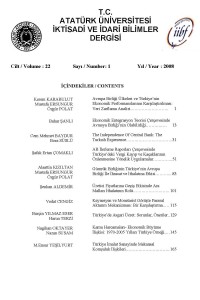Öz
Bu çalışmada, farklı disiplinlerden bir çok bilim adamının üzerinde
çalışmalar yaptığı sosyal sermaye konusu incelenmeye çalışılmaktadır. Sosyal
sermayenin, beşeri sermaye ve kültürel sermaye gibi diğer sermaye türleriyle olan
ilişkisi tartışılmaktadır. Özellikle sosyal sermayenin organizasyonların öngörü
yeteneğinin gelişmesindeki rolü açıklanmaya çalışılmaktadır.
Çalışmanın amacı ise, sosyal sermayenin örgütsel ve toplumsal yapılar
için öneminin vurgulanmasıdır.
Anahtar Kelimeler
Sosyal sermaye Beşeri sermaye Kültürel sermaye Örgütsel öngörü
Kaynakça
- Bell, Emma, Taylor, S. (2002). “A Step In The Right Direction?.........”, British Journal Of Management, Vol.13, 161-172.
- Bourdieu, P. (1985). The Forms Of Capital. In Handbook Of Theory And Research For The Sociology Of Education, Ed. J. G. Richardson, 241– 258. New York: Greenwood.
- Cuhls, Kertsin. (2003). “From Forecasting To Foresight Process……..”, Journal Of Forecasting, Vol. 22, S. 93-111.
- Field, John. (2003) Social Capital, Routledge.
- Fukuyama, Francıs. (2001) Social Capital, Civil Society And Development Third World Quarterly, Vol 22, No 1, S. 7– 20,
- Fukuyama, Francis. (1995). Trust: The Social Virtues And The Creation Of Prosperity, New York: Free Press, , Pp 83–96.
- Goh, Swee C. (2001) “The Learning Organizations:……”, Journal Of Theory&Behaviour, 4(3), 329-355.
- Grootaert, Christiaan, Bastelaer, Thierry Van. (2002) The Role Of Social Capital İn Development: An Empirical Assessment, Cambridge University Pres.
- Hofferth, Sandra L. , Johanne, Boisjoly. (1999) “The Development Of Social Capital”, Rationality&Society, Vol. 11, 79-104.
- Karp, Tom. (2004) “Building Foresight Abilities İn Organizations……..”, Futures Research Quarterly, 5-30.
- Lewin, Peter. (1999) Capital İn Disequilibrium: The Role Of Capital İn A Changing World, Routledge.
- Lin, Nan. (2001) Social Capital: A Theory Of Social Structure And Action, Cambridge University Pres.
- Moran, Peter. Ghoshal. (1996) “Value Creation By Firms”, Academy Of Management Proceedings, S. 242-268.
- Nahapiet, Janine Ve Sumantra Ghoshal. (1998) “Social Capital, Intellectual Capital And The Organizational Advantage”, Academy Of Management Review, Vol. 23, No. 2, S. 242-268.
- Onyx, Jenny, Paul Bullen, (2000) “Measuring Social Capital In Five Communities”, Journal Of Applied Behavioral Science, 36(1), 23-41.
- Portes, Alejandro. (1998) Social Capital: Its Origins And Applications In Modern Sociology.
- Putnam, R. D. (1995). Bowling Alone: America’s Declining Social Capital, Journal Of Democracy 6:65–78.
- Putnam, R. D. (1996) Who Killed Civic America? Prospect March: 66–
- Robinson, Lindon; Schmid, A. Allan; Siles, Marcelo E. (2002) “Is Social Capital Really Capital”, Review Of Social Economy, 60 (1).
- Robert, Putnam. (1993) “The Prospperous Community”, Current, Ss. 4–10.
- Robert, Putnam. (1995) “Bowlıng Alone:…..”, Current, Ss. 3-10.
- Woolcock, Michael (1998) “Social Capital And Economic Development:…”, Theory And Society, Vol. 27, 151-208.
- Coleman, James (1988). "Social Capital İn The Creation Of Human Capital," American Journal Of Sociology. 94 Supplement:(Pp. S95-S-120).
- Toıvonen, Jouko. Mattila, Merja. (2001) “Critical Aspects Of Organizational Learning Research….”, British Journal Of Management, Vol.12, 113- 130.
Öz
Kaynakça
- Bell, Emma, Taylor, S. (2002). “A Step In The Right Direction?.........”, British Journal Of Management, Vol.13, 161-172.
- Bourdieu, P. (1985). The Forms Of Capital. In Handbook Of Theory And Research For The Sociology Of Education, Ed. J. G. Richardson, 241– 258. New York: Greenwood.
- Cuhls, Kertsin. (2003). “From Forecasting To Foresight Process……..”, Journal Of Forecasting, Vol. 22, S. 93-111.
- Field, John. (2003) Social Capital, Routledge.
- Fukuyama, Francıs. (2001) Social Capital, Civil Society And Development Third World Quarterly, Vol 22, No 1, S. 7– 20,
- Fukuyama, Francis. (1995). Trust: The Social Virtues And The Creation Of Prosperity, New York: Free Press, , Pp 83–96.
- Goh, Swee C. (2001) “The Learning Organizations:……”, Journal Of Theory&Behaviour, 4(3), 329-355.
- Grootaert, Christiaan, Bastelaer, Thierry Van. (2002) The Role Of Social Capital İn Development: An Empirical Assessment, Cambridge University Pres.
- Hofferth, Sandra L. , Johanne, Boisjoly. (1999) “The Development Of Social Capital”, Rationality&Society, Vol. 11, 79-104.
- Karp, Tom. (2004) “Building Foresight Abilities İn Organizations……..”, Futures Research Quarterly, 5-30.
- Lewin, Peter. (1999) Capital İn Disequilibrium: The Role Of Capital İn A Changing World, Routledge.
- Lin, Nan. (2001) Social Capital: A Theory Of Social Structure And Action, Cambridge University Pres.
- Moran, Peter. Ghoshal. (1996) “Value Creation By Firms”, Academy Of Management Proceedings, S. 242-268.
- Nahapiet, Janine Ve Sumantra Ghoshal. (1998) “Social Capital, Intellectual Capital And The Organizational Advantage”, Academy Of Management Review, Vol. 23, No. 2, S. 242-268.
- Onyx, Jenny, Paul Bullen, (2000) “Measuring Social Capital In Five Communities”, Journal Of Applied Behavioral Science, 36(1), 23-41.
- Portes, Alejandro. (1998) Social Capital: Its Origins And Applications In Modern Sociology.
- Putnam, R. D. (1995). Bowling Alone: America’s Declining Social Capital, Journal Of Democracy 6:65–78.
- Putnam, R. D. (1996) Who Killed Civic America? Prospect March: 66–
- Robinson, Lindon; Schmid, A. Allan; Siles, Marcelo E. (2002) “Is Social Capital Really Capital”, Review Of Social Economy, 60 (1).
- Robert, Putnam. (1993) “The Prospperous Community”, Current, Ss. 4–10.
- Robert, Putnam. (1995) “Bowlıng Alone:…..”, Current, Ss. 3-10.
- Woolcock, Michael (1998) “Social Capital And Economic Development:…”, Theory And Society, Vol. 27, 151-208.
- Coleman, James (1988). "Social Capital İn The Creation Of Human Capital," American Journal Of Sociology. 94 Supplement:(Pp. S95-S-120).
- Toıvonen, Jouko. Mattila, Merja. (2001) “Critical Aspects Of Organizational Learning Research….”, British Journal Of Management, Vol.12, 113- 130.
Ayrıntılar
| Birincil Dil | tr;en |
|---|---|
| Bölüm | Makaleler |
| Yazarlar | |
| Yayımlanma Tarihi | 27 Kasım 2010 |
| Yayımlandığı Sayı | Yıl 2008 Cilt: 22 Sayı: 1 |





